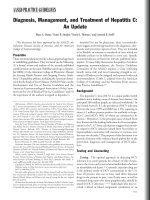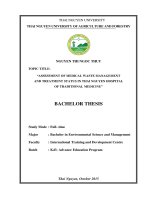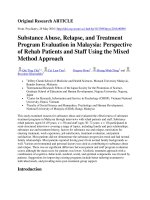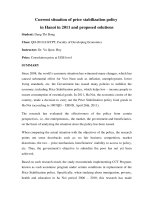Current situation of management and treatment of tuberculosis in Bac Giang province in the period of 2014-2018
Bạn đang xem bản rút gọn của tài liệu. Xem và tải ngay bản đầy đủ của tài liệu tại đây (280.11 KB, 6 trang )
ISSN: 1859-2171
e-ISSN: 2615-9562
TNU Journal of Science and Technology
225(05): 32 - 37
CURRENT SITUATION OF MANAGEMENT AND TREATMENT OF
TUBERCULOSIS IN BAC GIANG PROVINCE IN THE PERIOD OF 2014-2018
Hoang Ha, Vi Thi Luong*
TNU – University of Medicine and Pharmacy
ABSTRACT
The study was conducted by analyzing data in book and reports of Bac Giang Tuberculosis and
Lung Disease Hospital in the period of 2014-2018 to describe the situation of tuberculosis
management and treatment in Bac Giang and evaluate the treatment results after 5 years of
tuberculosis patients have been managed and treated in Bac Giang province for the period of 20142018. The study is based on the cross-sectional description method, taking all the numbers on the
basis of collecting all information from books, reports on tuberculosis management activities of
the whole province from 2014-2018. The study results showed that the number of tuberculosis
detected AFB (+) newly decreased from 43.86 - 40.60, relapse increased from 3.94 - 13.23,
tuberculosis increased 62.96 – 74.31. For R = 1.67, the detection was 50.55%, which is about ½ of
the estimated number. The recovery rate of AFB (+) new pulmonary patients in the 2014-2018
period was 95.82%. Thus, the rate of detection of AFB (+) new tuberculosis decreased while the
rate of tuberculosis recurrence and tuberculosis of all types increased over the years. The
possibility of detecting new AFB (+) pulmonary tuberculosis in Bac Giang over 5 years was only
about half of the estimated number. The cure rate of AFB (+) new tuberculosis patients in 20142018 period was higher than the National Tuberculosis Control Program.
Key words: Tuberculosis in Bac Giang; Bac Giang; tuberculosis management tuberculosis;
treatment; AFB.
Received: 05/12/2019; Revised: 27/4/2020; Published: 28/4/2020
THỰC TRẠNG QUẢN LÝ VÀ ĐIỀU TRỊ LAO
TẠI TỈNH BẮC GIANG GIAI ĐOẠN 2014-2018
Hoàng Hà, Vi Thị Lương*
Trường Đại học Y Dược - ĐH Thái Nguyên
TÓM TẲT
Nghiên cứu được thực hiện trên toàn bộ sổ sách, báo cáo của Bệnh viện Lao và bệnh phổi tỉnh Bắc
Giang giai đoạn 2014-2018 nhằm mô tả thực trạng quản lý và điều trị lao tại tỉnh Bắc Giang và
đánh giá kết quả điều trị sau 5 năm của bệnh nhân lao đang được quản lý và điều trị tại tỉnh Bắc
Giang giai đoạn 2014-2018. Nghiên cứu dựa trên phương pháp mô tả cắt ngang, lấy toàn bộ số lao
trên cơ sở thu thập toàn bộ thông tin từ sổ sách, báo cáo hoạt động quản lý điều trị lao của toàn
tỉnh thời gian từ 2014-2018. Nghiên cứu cho thấy số lao phát hiện: AFB(+) mới giảm từ 43,8640,60, tái phát tăng từ 3,94 - 13,23, lao các thể tăng 62,96 - 74,31. Với R=1,67, phát hiện đạt
50,55% đạt khoảng ½ so với số ước tính. Tỉ lệ khỏi của bệnh nhân lao phổi AFB (+) mới giai đoạn
2014 - 2018 là 95,82%. Như vậy tỷ lệ phát hiện lao AFB (+) mới giảm qua các năm, tỷ lệ lao tái
phát và các thể tăng qua các năm. Khả năng phát hiện lao phổi AFB (+) mới của tỉnh Bắc Giang
qua 5 năm chỉ đạt khoảng ½ so với số ước tính. Tỉ lệ điều trị khỏi bệnh nhân lao phổi AFB (+) mới
giai đoạn 2014 - 2018 cao hơn Chương trình chống lao quốc gia.
Từ khóa: Bệnh lao tại Bắc Giang; Bắc Giang; quản lý lao; điều trị lao; AFB.
Ngày nhận bài: 05/12/2019; Ngày hoàn thiện: 27/4/2020; Ngày đăng: 28/4/2020
* Corresponding author. Email:
DOI: />
32
; Email:
Hoang Ha et al.
TNU Journal of Science and Technology
1.Introduction
Tuberculosis (TB) is still one of the most
common and fatal illnesses worldwide.
According to estimates by the World Health
Organization (WHO) in 2013, around 12
million people worldwide were currently
infected with tuberculosis, and about 1.3 million
people died of tuberculosis. Despite all human
control and control efforts, tuberculosis has not
been relieved and has become increasingly
complex with the emergence of resistant strains
of tuberculosis [1].
Tuberculosis in our country so far has not
escaped from countries with high tuberculosis
burden in the region, ranking 12th among 22
countries with high TB prevalence in the
world. and 14th among 27 countries with the
highest MDR-TB burden in the world [2]. In
the past few years, the attention of the
National Tuberculosis Control Program
(NTP)-level committee, the local authorities
and the tuberculosis prevention work of Bac
Giang province has obtained certain results.
The anti-tuberculosis network has been
strengthened from provincial to commune
levels; people's awareness and understanding
of tuberculosis has improved;
and
tuberculosis services have been brought near
to the people. The number of TB patients
detected in the next year is higher than the
previous year; the effectiveness of treatment
is increasing; the mortality rate decreases
compared to previous years. According to
statistics of the Tuberculosis and Lung
Disease Hospital in Bac Giang Province: in
2014, 712 new tuberculosis patients were
detected, much larger than 2013 when only
534 new TB patients were found [3].
However, According to the annual report of
the national anti-tuberculosis program, the
situation of tuberculosis in mountainous
provinces is still high and very complicated
[4]. In recent years, the report on the
tuberculosis prevention activities of the
province has not been good. The situation of
tuberculosis is still severe; people with
tuberculosis have not been examined or
; Email:
225(05): 32 - 37
detected late; the treatment results are not
high, leaving many sequelae. According to
statistics of Bac Giang Tuberculosis and Lung
Hospital, the number of tuberculosis patients
treated in 2018 was 116. Tuberculosis tends
to be complicated, tuberculosis/HIV, multidrug resistant tuberculosis increase. Results of
treatment completion in Lam Dong were high
at 93.6%, especially in cases of AFB (+)
pulmonary tuberculosis. Three-year death rate
is 4.9% [5]. In order to achieve high TB
treatment results then TB management should
be well implemented. Adherence to the
principles of TB treatment is a prerequisite for
determining the outcome of treatment, reducing
drug resistance[6]. To supplement previous
state-of-art reviews on anti-tuberculosis
treatment and to pave the way forward with
reference to the current status, researchers
systematically reviewed published literature on
clinical research on tuberculosis (TB) over the
past decade in the treatment of drug-susceptible
and multidrug-resistant TB (MDR-TB), with a
focus on drugs, dosing factors and regimens[7].
Tuberculosis treatment remains a challenge due
to the need to consider, when approaching it, the
context of individual and collective health. In
addition, social and economic issues have been
shown to be variables that need to be considered
when it comes to treatment effectiveness[8].
Financial aid for the program is expected to
decline this year as well as the coming years
as Vietnam becomes a middle-income
country. Assessment of TB management and
treatment in Bac Giang province is essential.
Based on this fact, we conducted the project:
"Practical management and treatment of TB
in Bac Giang province in the period of 20142018" with the following goals:
1. Describe the situation of TB management
and treatment in Bac Giang province in the
period of 2014-2018.
2. Evaluate the treatment results after 5 years
of tuberculosis patients being managed and
33
Hoang Ha et al.
TNU Journal of Science and Technology
treated in Bac Giang province for the period
of 2014-2018.
2. Subjects and methods of the study
225(05): 32 - 37
+ Select quantitative research sample: select
the target sample of the research sample to
meet the set objectives.
2.1. Research subjects: Books, reports, forms
of summarizing statistics on the situation of TB
management and treatment of the health system
of Bac Giang province from 2014 - 2018.
2.5. Research targets:
2.2. Location and study time:
- New AFB (+) TB detection indicators
compared to estimates over 5 years.
- Research location: Tuberculosis and Lung
Disease Hospital in Bac Giang province.
- Research period: From January 2019 to
December 2019.
2.3. Research method and design:
- Research methodology: Use descriptive
research method.
- Research design: Retrospective, crosssectional research design, combined with
quantitative.
- Research descriptive study to investigate the
situation of management and treatment of
tuberculosis patients in Bac Giang province in
the period of 2014-2018 basing on collecting
all information from books, reports on TB
treatment management activities of the whole
province from 2014-2018.
- Descriptive cross-sectional study to identify
the current situation of TB treatment
management in Bac Giang province.
2.4. Sample size and sampling techniques:
- Size of quantitative research samples:
+ Sample size to assess the situation of TB
treatment management in Bac Giang province
in the period of 2014-2018.
+ Sample size for survey of resources,
equipment, infrastructure, hospitals, district
health centers and health stations at Bac
Giang tuberculosis and lung disease hospital,
commune, ward and town in 2014 - 2018.
+ Sample size to investigate the current
situation of TB treatment management in Bac
Giang province.
- Sampling:
34
- The detection rates over 5 years: new,
recurring AFB (+) and other forms of
tuberculosis.
- Results of treatment of tuberculosis patients
over 5 years: Patients manage, recover,
complete treatment, abandon treatment, death,
treatment failure, transfer, do not evaluate.
2.6. Technical data collection: Collect
quantitative data through the questionnaire.
2.7. Methods of data processing: Medical
statistics.
3. Results and discussion
Table 1 presents situation of detection of TB
patients from 2014-2018. TB detection tended
to increase from 106.42/100,000 people
(2015) to 119.04/ 100,000 people (2016). In
the period of 2014-2018 the rate of TB
detection in Bac Giang was 117.27/ 100,000
people. This rate is higher than the rate of
TB detection in the National Occupational
Standards of Vietnam in 2015 (110.88/
100,000 people) [4]. In addition, our results
compared with the results of Do Quang Hai
(2013) in Dien Bien showed that the
incidence of AFB (+) was 117/ 100,000
people [9]. That our results are higher than
those can be explained by: (1) The
epidemiology of tuberculosis in Bac Giang is
higher than other regions so the rate of
detection of new TB AFB (+) is higher. (2)
Possibilities New TB detection in Bac Giang
of tuberculosis prevention is higher than
other regions.
In the period of 2014-2018, the rate of
detection of recurrent TB was not as high as
the general rate but it tended to increase
gradually from 3.94/ 100,000 people to 13.23/
100,000 people. It can be seen that the
treatment management activities of the Anti; Email:
Hoang Ha et al.
TNU Journal of Science and Technology
Tuberculosis Program (CTCL) at this stage
are not good. The highest incidence of
tuberculosis in 2016 was 82.68/ 100,000
people; the lowest in 2014 was 62.96/
100,000 people and the 5-year average was
225(05): 32 - 37
71.88/ 100,000 people. In general, the rate of
all TB detection is lower than the rate of TB
detection in Vietnam NTP in 2015 was
110.88/ 100,000 people [10].
Table 1. Situation of detection of TB patients from 2014-2018
Year
2014
2015
2016
2017
2018
Total
Population
1,624,456
1,632,423
1,653,397
1,663,763
1,670,000
8,244,039
Tuberculosis AFB (+)
New
Recurrence
N
/105
N
/105
712
43.86
64
3.94
612
37.52
55
3.37
532
32.17
74
4.48
674
40.51
120
7.21
678
40.60
221
13.23
3,208
38.91
534
6.48
Tuberculosis of all
types
n
/105
1,022
62.96
1,069
65.53
1,378
82.68
1,216
73.08
1,241
74.31
5,926
71.88
Total
n
1,798
1,736
1,984
2,010
2,140
9,668
/105
110.76
106.42
119.04
120.80
128.14
117.27
Table 2. Detection capability against estimated epidemiological data
Year
Population
2014
2015
2016
2017
2018
1,624,456
1,632,423
1,653,397
1,663,763
1,670,000
Number of sufferers
712
612
532
674
678
New tuberculosis AFB (+)
Number estimate
% Compared to estimate
1,251
56.91
1,257
48.69
1,273
41.79
1,281
52.62
1,286
52.72
Note: Epidemiological index estimated by NTP 77/ 100,000 people
Table 2 is detection capability against estimated epidemiological data. We see the possibility of
detecting new AFB (+) pulmonary tuberculosis in Bac Giang over the years was only about half
of the estimated number. The highest was in 2014 with 56.91% and the lowest was in 2016 with
41.79% compared to the estimate. Bac Giang has not reached the goal of the NTP (70% of the
estimate) [11]. Thus, with about 50% of patients with pulmonary tuberculosis AFB(+) new
undiscovered and managed for treatment, this was a dangerous source of infection for the
community and a warning to TB detection in Bac Giang province. This result also shows that TB
detection activity in Bac Giang in the period of 2014-2018 had many limitations or the epidemic
in Bac Giang actually decreased compared to the national epidemic.
Table 3. Treatment results for new AFB (+) pulmonary patients from 2014-2018
Year
Result
Patient administered
Off
Complete treatment
Discard treatment
Dead
Treatment failed
Move
No reviews
2014
2015
2016
2017
2018
Total
%
712
687
11
1
2
0
9
2
612
591
10
1
1
0
7
2
532
510
9
2
3
0
7
1
674
645
10
3
6
0
8
2
678
641
15
4
7
0
8
3
3,208
3,074
55
11
19
0
39
10
100
95.82
1.71
0.34
0.59
0.00
1.22
0.31
Table 3 is treatment results for new AFB (+)
pulmonary
patients
from
2014-2018.
Obviously, the goal of TB treatment
management is to have many patients cured.
; Email:
The results of Table 3 shows that the recovery
rate of patients with AFB (+) pulmonary
tuberculosis in the period 2014-2018 was
95.82%. The cure rate of patients with AFB
35
Hoang Ha et al.
TNU Journal of Science and Technology
(+) pulmonary tuberculosis who completed
the 5-year average treatment was 1.71%.
These results have surpassed the goals of the
NTP (> 85% of patients with AFB (+)
tuberculosis who had just been cured) [6].
Our results are higher than the rate of
treatment from new AFB (+) patients in the
2015 CTCL Vietnam report of 89.5% [1]. Our
results were higher than those of Luu Van
Binh (2012) in Tuyen Quang with the new
results of treatment of tuberculosis AFB (+):
from 72.73% but lower than the rates of
finished treatment 9.19%; 4.45% transfer;
failure 3.06%; dropped 0.09%; died 1.98%;
did not evaluate 8.5% [12]. This difference in
our opinion is due to many factors such as
differences in the study sites, the
epidemiological
characteristics
of
tuberculosis in the study sites, the patients,
the professional quality of physicians or the
differences of tuberculosis prevention
network operation.
In summary, TB detection activity in Bac
Giang was quite high and met the
requirements of the NTP. Bac Giang needs to
promote and make more efforts in the fight
against tuberculosis. And the result of
tuberculosis treatment in Bac Giang has met
the goal of NTP with high quality of
treatment which should be maintained and
promoted in the period of 2019-2020. At the
same time, Bac Giang tuberculosis industry
needs to strengthen and actively monitor and
promote the quantity and quality of
tuberculosis management activities in the
coming period.
4. Conclusion
The study of the situation of TB management
and treatment in Bac Giang province has the
following conclusions:
Regarding the rate of TB detection from
2014-2018: The number of detected TB: AFB
(+) decreased from 43.86 to 40.60; the
recurrence increased from 3.94 to 13.23 and
36
225(05): 32 - 37
other forms increased from 62.96 to 74.31.
The possibility of detecting new AFB (+)
pulmonary tuberculosis in Bac Giang over 5
years was only about half of the estimated
number. The recovery rate of AFB (+) new
pulmonary patients in the 2014-2018 period was
95.82%. The recovery rate of AFB (+) new
pulmonary patients in the 2014-2018 period was
95.82%. The cure rate of patients with AFB (+)
pulmonary tuberculosis who completed the 5year average treatment was 1.71%.
REFERENCES
[1]. Vietnam National Tuberculosis Control
Program, Guidelines for Implementation of
the National Tuberculosis Control Program.
Hanoi Medical Publishing House, 1999.
[2]. World Health Organization, Global
tuberculosis report, 2014.
[3]. Vietnam Ministry of Health, Summary report
on anti-tuberculosis activities in 2014 and
directions for 2015, 2014.
[4]. Vietnam National anti-tuberculosis program,
Reviewing tuberculosis prevention in the period
of 2007-2008 and operational direction 20092011, Ha Noi, 2009, pp.15-19.
[5]. D. Vu, Q. A. Tran, and D. P. Vo, “Management
and treatment of tuberculosis patients in Duc
Trong district, Lam Dong province 2010-2012,”
Vietnam Journal of Preventive Medicine, vol.
6(166), p.70, 2015.
[6]. T. M. L. Uong, T. H. Ho, and T. T. V. Vu,
“Associated factors on TB treatment
adherence among pulmonary tuberculosis
patients at Hai Ba Trung District TB clinic,
Ha Noi,” Vietnam Journal of Public Health,
vol. 20(20), pp. 24-28, 2011.
[7]. K. C. Chang, W. W. Yew, and G. Sotgiu,
“Clinical research in the treatment of
tuberculosis: current status and future
prospects,” Int J Tuberc Lung Dis., 19(12), pp.
1417-1427, 2015, doi: 10.5588/ijtld.15.0216.
[8]. M. F. Rabahi, J. L. R. da S. Júnior, A. C. G.
Ferreira, D. G. S. Tannus-Silva, and M. B.
Conde, “Tuberculosis treatment,” J Bras
Pneumol., vol. 43(6), pp. 472-486, 2017, doi:
10.1590/S1806-37562016000000388.
[9]. Vietnam Ministry of Health, Summary report
on activities of the National Tuberculosis
Program 2014 and operational orientations
for 2015, 2015.
; Email:
Hoang Ha et al.
TNU Journal of Science and Technology
[10]. Q. H. Do, “Prevalence of pulmonary
tuberculosis in Dien Bien in 2010-2011,” the
4th Asia Pacific region conference of the
international union against tuberculosis and
lung disease, Ha Noi, 2013, p. 131.
[11]. National Tuberculosis Program, Guidelines
for TB Management. Hanoi Medical
Publishing House, 2009.
; Email:
225(05): 32 - 37
[12]. V. B. Luu, “Situation of discovery
management and treatment of tuberculosis
patients and results of training to improve
tuberculosis
prevention
capacity
for
grassroots health workers in Tuyen Quang
province”, PhD thesis level II, TNU
University of Medicine and Pharmacy, 2012.
37









